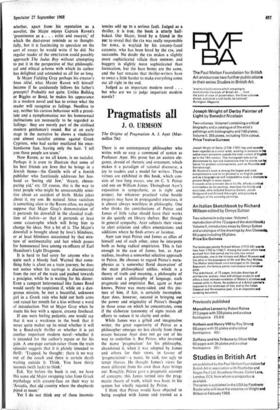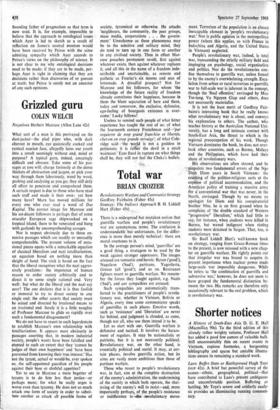Pragmatists all
J. 0. URMSON
There is no contemporary philosopher who writes with so easy a command of syntax as Professor Ayer. His prose has an austere ele- gance, devoid of rhetoric and ornament, which makes it a paradigm of rational discourse, a joy to readers and a model for writers. These virtues are exhibited in this book, which con- sists of two long essays, one on C. S. Peirce and one on William James. Throughout Ayer's exposition is sympathetic, as is right and proper; for whatever practical value hostile exegesis may have in propagandist exercises, it is almost always worthless in philosophy. One who thinks the contributions of Peirce and James of little value should leave their works to die quietly on library shelves. But though in general sympathy, Ayer subjects their views to alert criticism and offers emendations and additions where he finds errors or lacunae.
Ayer can treat Peirce and James as allies of himself and of each other, since he interprets both as being radical empiricists. This is fair enough in the case of James, but, as Ayer realises, involves a somewhat selective approach to Peirce. He chooses to regard Peirce's meta- physics as 'a somewhat florid decoration' of the main philosophical edifice, which is a theory of truth and meaning, a philosophy of science and a philosophy of language, each pragmatic and empiricist. But, again as Ayer knows, Peirce was many-sided, and this pic- ture of him, if fair, is certainly incomplete. Ayer does, however, succeed in bringing out the power and originality of Peirce's thought in those areas on which he concentrates, even if the elaborate taxonomy of signs resists all efforts to reduce it to clarity and order.
While James was a gifted and imaginative writer, the great superiority of Peirce as a philosopher emerges no less clearly from these essays because Ayer does not go out of his way to underline it. But Peirce, who invented the name 'pragmatism' for his philosophy, abandoned it, when it was adopted by James and others for their views, in favour of 'pragmaticism'—a name, he said, too ugly to tempt thieves. He thought James's views far more different from his own than Ayer brings out. Roughly, Peirce gave a pragmatic account of concepts; this James turned into the prag- matist theory of truth, which was basic to his system but wholly rejected by Peirce.
I think that Peirce would have objected to being coupled with James and treated as a
founding father of pragmatism as that term is now used. It is, for example, impossible to believe that the approach to ontological issues which Ayer is led to sketch as a result of reflection on James's neutral monism would have been received by Peirce with the sable admiring sympathy which Ayer accords to Peirce's views on the philosophy of science. It is not clear to me why ontological decisions need to be made; if they are to be made, per- haps Ayer is right in claiming that they are decisions rather than discoveries •of or guesses at truth; but Peirce is surely not an ancestor of any such opinions.











































 Previous page
Previous page